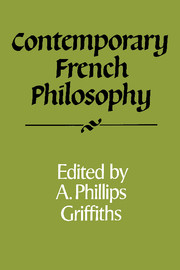Book contents
- Frontmatter
- Contents
- Preface
- Continental Insularity: Contemporary French Analytical Philosophy
- The Misprision of Pragmatics: Conceptions of Language in Contemporary French Philosophy
- Ants and Women, or Philosophy without Borders
- Motifs towards a Poetics
- The Relevance of Cartesianism
- The Enlightenment without the Critique: A Word on Michel Serres' Philosophy
- The Teleological and Deontological Structures of Action: Aristotle and/or Kant?
- The Crisis of the Post-modern Image
- Merleau-Ponty and the Phenomenology of Perception
- Epistemological History: The Legacy of Bachelard and Canguilhem
- History as Genealogy: An Exploration of Foucault's Approach to History
- Beyond Deconstruction?
- Further Adventures of the Dialectic: Merleau-Ponty, Sartre, Althusser
- Paradoxes of the Pineal: From Descartes to Georges Bataille
- Notes on Contributors
- Index
The Crisis of the Post-modern Image
Published online by Cambridge University Press: 25 May 2010
- Frontmatter
- Contents
- Preface
- Continental Insularity: Contemporary French Analytical Philosophy
- The Misprision of Pragmatics: Conceptions of Language in Contemporary French Philosophy
- Ants and Women, or Philosophy without Borders
- Motifs towards a Poetics
- The Relevance of Cartesianism
- The Enlightenment without the Critique: A Word on Michel Serres' Philosophy
- The Teleological and Deontological Structures of Action: Aristotle and/or Kant?
- The Crisis of the Post-modern Image
- Merleau-Ponty and the Phenomenology of Perception
- Epistemological History: The Legacy of Bachelard and Canguilhem
- History as Genealogy: An Exploration of Foucault's Approach to History
- Beyond Deconstruction?
- Further Adventures of the Dialectic: Merleau-Ponty, Sartre, Althusser
- Paradoxes of the Pineal: From Descartes to Georges Bataille
- Notes on Contributors
- Index
Summary
We now inhabit what cultural critics are increasingly calling the ‘post-modern’ age. I propose to explore here some of the implications of the advent of post-modernism for our understanding of the status of images and imaging. Indeed, this question is of added relevance when one considers that post-modern culture is frequently referred to as a ‘civilization of the image’ (a phrase first used by Roland Barthes).
The role of the image in post-modern culture is essentially one of parody. By this is meant that the image no longer refers primarily to some ‘original’, situated outside of itself in the ‘real’ world or inside of human consciousness. Devoid of any fixed reference to an origin, the image appears to refer only to other images. The post-modern image circulates in a seemingly endless play of imitation. Each image becomes a parody of another which precedes it … and so on. The idea of an ‘authentic’ image is thus subverted—as is evident in the practices of parody and pastiche which predominate in contemporary forms of representation.
Hence we note that the pre-modern model of the image as mirror (as in Book X of Plato's Republic for example) and the modern model as lamp (as in German Idealist and romantic notions of Einbildungskraft or the creative imagination) give way to the post-modern model of a Circle of looking glasses—each one reproducing the surface images of the other in a play of infinite multiplication.
- Type
- Chapter
- Information
- Contemporary French Philosophy , pp. 113 - 122Publisher: Cambridge University PressPrint publication year: 1989

